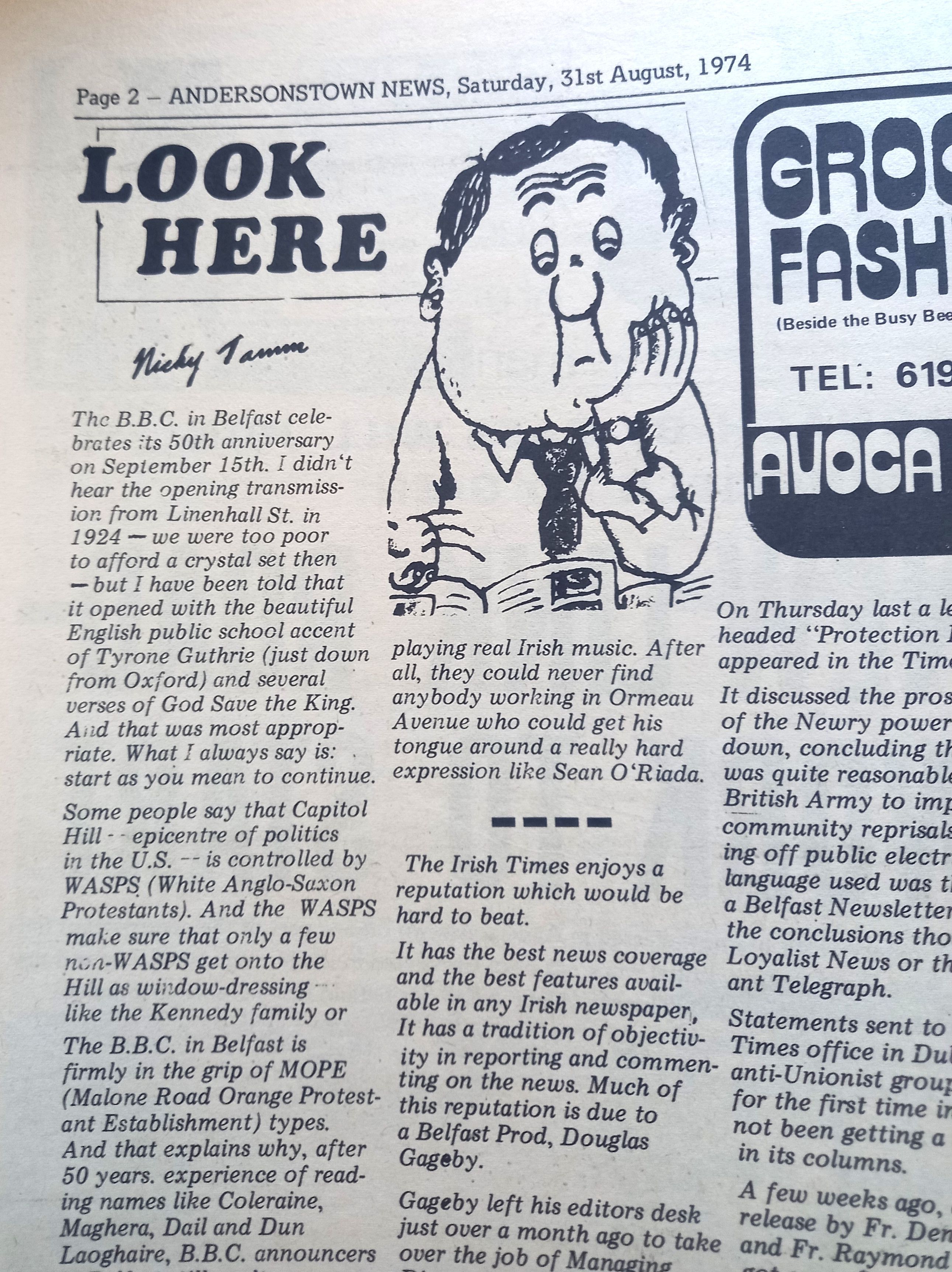This article by Nicky Tamm (the pen name of journalist Frank Doherty) first appeared on the 31 August 1974.
The BBC in Belfast celebrates its 50th anniversary on September 15th. I didn’t hear the opening transmission from Linenhall Street in 1924 – we were too poor to afford a crystal set then – but I have been told that it opened with the beautiful English public school accent of Tyrone Guthrie (just down from Oxford) and several verses of God Save the King. And that was most appropriate.
What I always say is: start as you mean to continue. Some people say that Capitol Hill – epicentre of politics in the U.S. – is controlled by WASPS (White Anglo-Saxon Protestants). And the WASPS make sure that only a few non-WASPS get onto the Hill as window-dressing like the Kennedy family.
The BBC in Belfast is firmly in the grip of MOPE (Malone Orange Protestant Establishment) types. And that explains why, after 50 years, experience of reading names like Coleraine, Maghera, Dáil and Dún Laoghaire, BBC announcers in Belfast still can’t pronounce them.
The language used was that of a Belfast News Letter leader, the conclusions those of the Loyalist News or the Protestant Telegraph. Statements sent to the Irish Times office in Dublin by anti-unionist groups have, for the first time in years, not been getting a mention in its columns.
It explains, too, why the ubiquitous Havelock Nelson – the station’s Musical Director and pianist with the barrel-organ touch – thinks he is being progressive when he organises a concert of Irish washerwomen-type music for the benefit of Irish peasant listeners like us.
Of course, in all charity, I can’t really blame them for not playing real Irish music.
After all, they could never find anybody working in Ormeau Avenue who could get his tongue around a really hard expression like Seán Ó Riada.
The Irish Times enjoys a reputation which would be hard to beat. It has the best news coverage and the best features available in any Irish newspaper. It has a tradition of objectivity in reporting and commenting on the news. Much of this reputation is due to a Belfast Prod, Douglas Gageby.
Gageby left his editor’s desk just over a month ago to take over the job of Managing Director of the paper. His position as editor was taken over by Fergus Pyle, a Dublin Prod who served as Northern Editor of the Irish Times for three years in Belfast.
Pyle is an old boy of Campbell College – the Eton of the Orange Order – and already little pieces of the Irish Times’ reputation are flying past like straws in the wind. On Tuesday last a leader headed: ‘Protection Racket’ appeared in the Times. It discussed the pros and cons of the Newry power shutdown, concluding that it was quite reasonable for the British Army to impose community reprisals by shutting off public electricity.
The language used was that of a Belfast News Letter leader, the conclusions those of the Loyalist News or the Protestant Telegraph. Statements sent to the Irish Times office in Dublin by anti-unionist groups have, for the first time in years, not been getting a mention in its columns.
A few weeks ago, a press release by Fr Denis Faul and Fr Raymond Murray got coverage in almost every Irish daily, including the Dublin evening papers. The statement announced the launching of the Desert Labour Campaign in Britain.
The only papers which didn’t mention it were, predictably, the Belfast News Letter and, unpredictably, the Irish Times. Good-bye Douglas Gageby. I suppose it’s about time I said something nice about someone. And there is one group of people I have a special admiration for whose activities are almost unknown.
The Green Cross Committee in Belfast has to raise £3,000 every week to help support the families of internees and other political prisoners. They do it by begging, collecting in pubs, running functions and excursions and working their guts out day and night.
They are not in the comfortable position of other charitable groups – getting pats on the back from friendly parish priests or their picture in the papers. The only thing they ever receive is a word of thanks from the families they help, indifference from the rest of us, and harassment from the Brits.
I’m not asking anyone to give them gratitude – they probably wouldn’t want it. Give them money instead. They can put all of it to good use.





